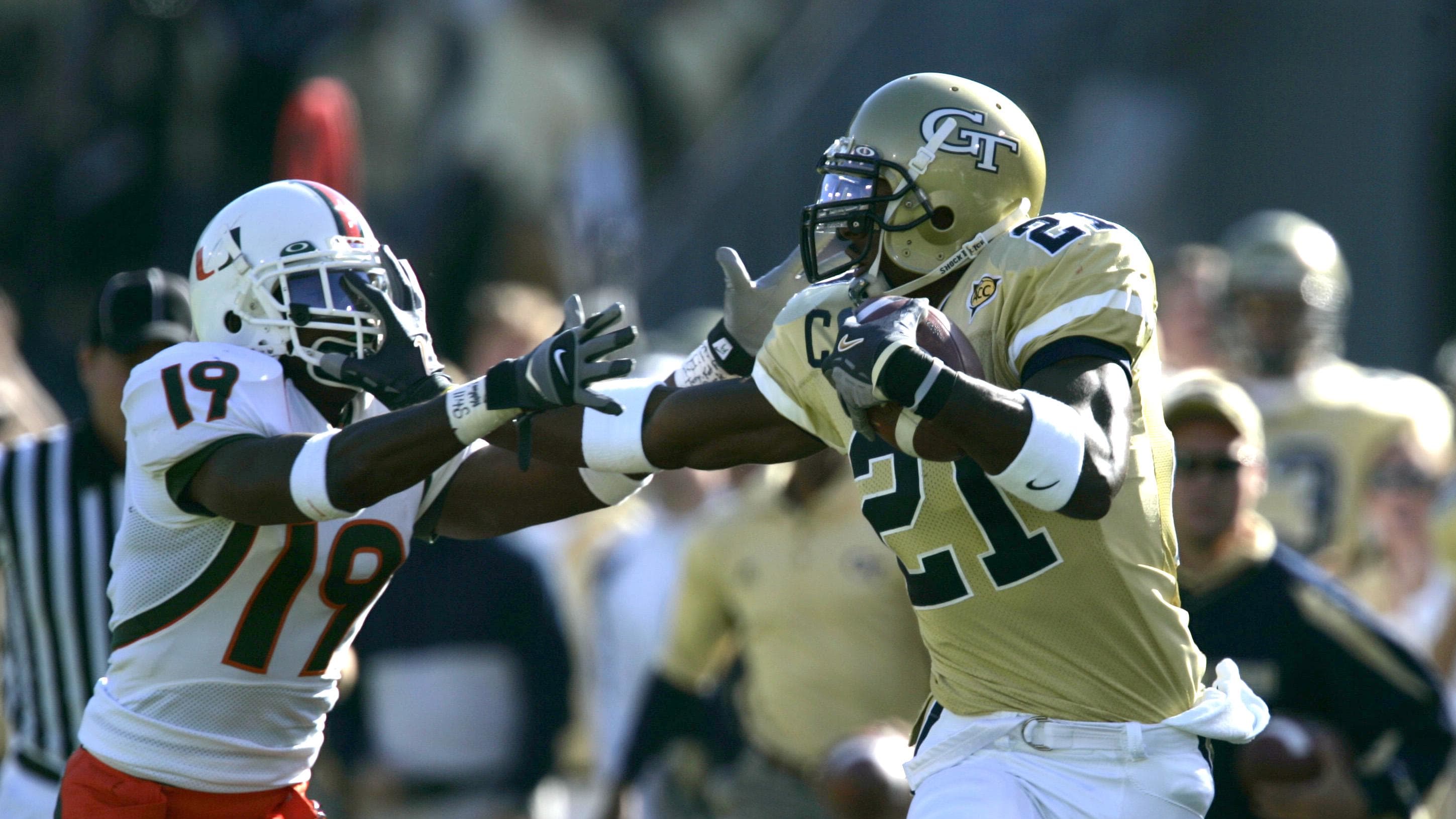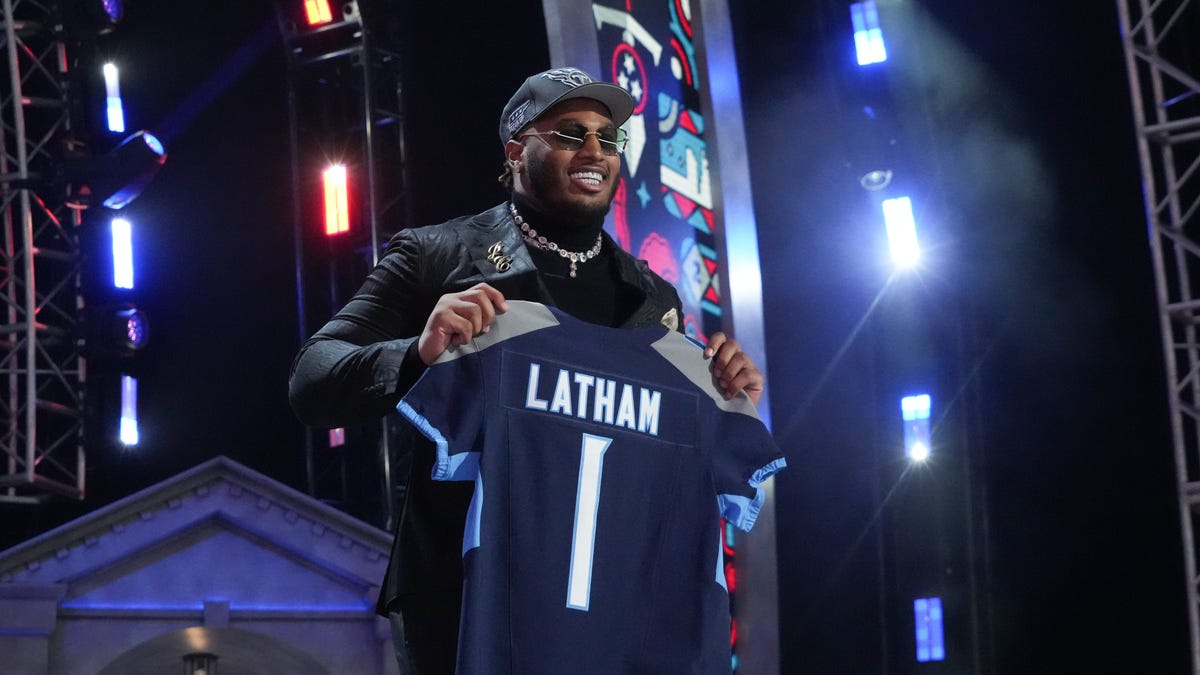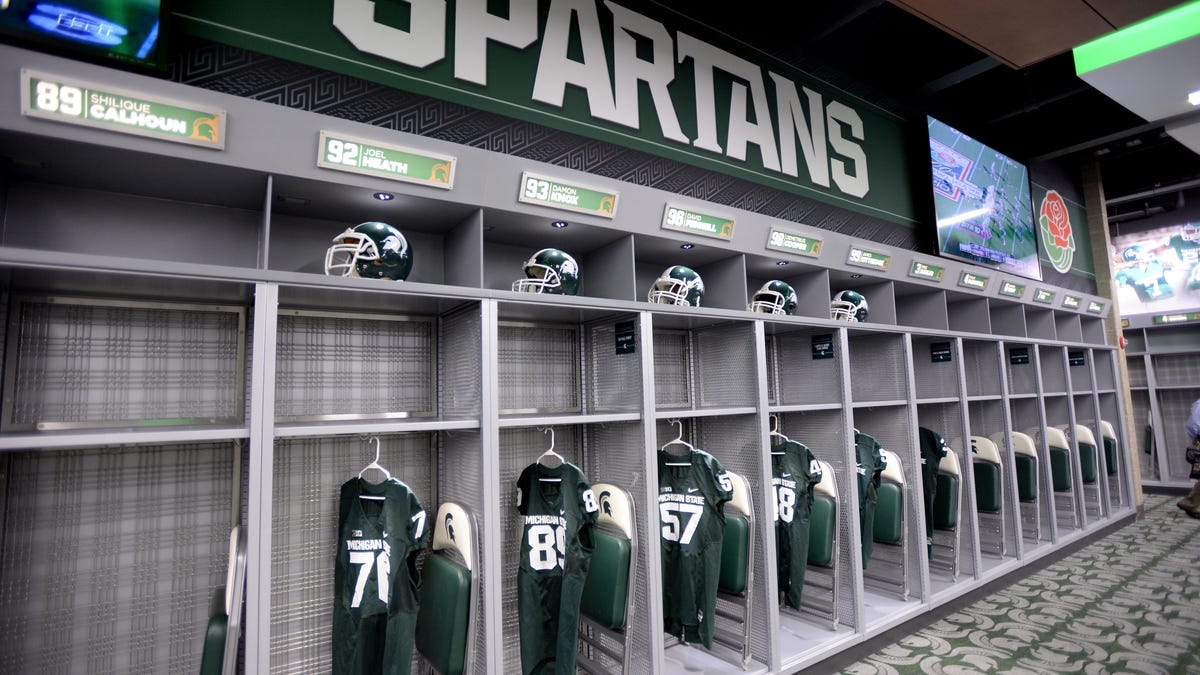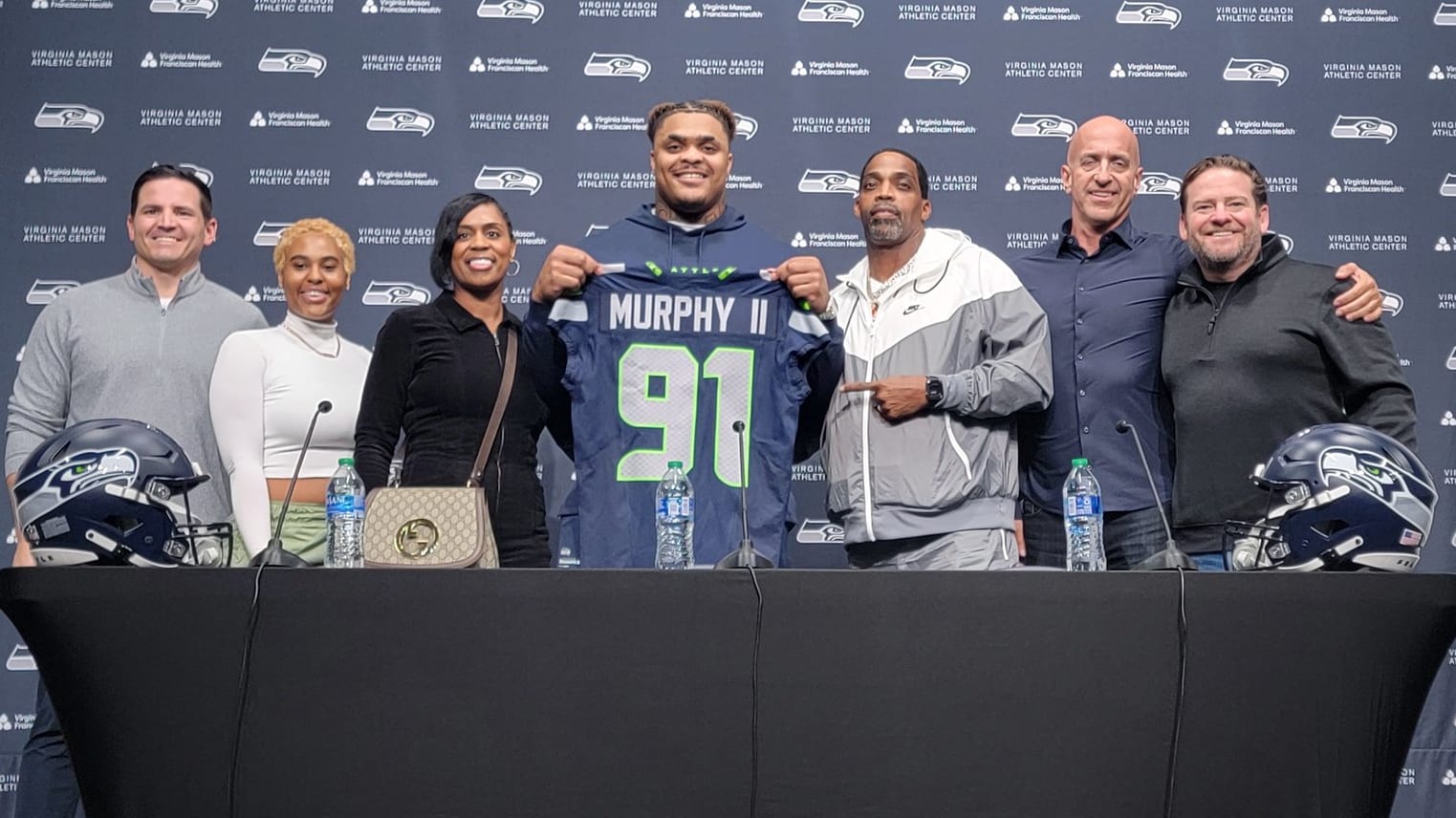Georgia
Looking Back at Every Georgia Tech First Round Pick Ahead of Tonight’s 2024 NFL Draft

Happy NFL Draft season to all who celebrate.
The first round of the 2024 NFL Draft is going to commence tonight and while there are not going to be any Georgia Tech Yellow Jackets selected tonight, some of the best NFL players of the last 15-20 years have come from Atlanta and were selected in the first round. Whether it was Calvin Johnson (one of the greatest receivers of all time), Demaryius Thomas, or Derrick Morgan, the Yellow Jackets have had several impact players go in the first round and turn out to be good NFL players. That is something that current head coach Brent Key is working to get back toward.
Lets take a look back at the first round picks that Georgia Tech has produced.
Eddie Prokop– No. 4 Overall, 1945 (Boston Yanks)
In the 1944 Sugar Bowl Prokop led his #13 Yellow Jackets to 20–18 victory over #15 ranked Tulsa. In that game, he rushed for 199 yards, threw a touchdown, and kicked two extra points.[3] The Sugar Bowl did not award a game MVP until 1948. (Per Wikipedia)
Larry Morris– No. 7 Overall, 1955 (LA Rams)
Morris was a four-year starter and a two-way player at center and linebacker positions for the Georgia Tech Yellow Jackets. Morris was also selected as three times first-team All-SEC and a team captain as a senior. He played during coach Bobby Dodd’s most successful seasons at Georgia Tech. The Yellow Jackets had a 40-5-2 record over Morris’ four seasons, won two SEC titles, four bowl games, and a share of the 1952 national championship with a 12–0 record. In his final game as a Yellow Jacket against rival Georgia in Athens on November 27, 1954, he played the entire game and was credited with 24 tackles as his team won 7–3. He was later named to the All-SEC 25-year team spanning 1950–1974 and in 1992 was inducted into the College Football Hall of Fame, one of 12 Tech players there (per Wikipedia)
Rufus Gutherie– No. 10 Overall, 1963 (LA Rams)
Eddie Lee Ivery- No. 17 overall, 1979 (Green Bay Packers)
He played at Georgia Tech from 1975-78 and remains the Yellow Jackets’ all-time leader in single-game (356 vs. Air Force – Nov. 11, 1998) and single-season (1,562 – 1978) rushing yards. He also finished his career as the Jackets’ all-time leading rusher with 3,517 career yards and still ranks third in Tech history in career rushing yardage. He went on to be selected No. 17 overall by the Green Bay Packers in the 1979 NFL Draft and rushed for 2,933 yards and 23 touchdowns in eight seasons with the Packers (1979-86). He was inducted into the Georgia Tech Sports Hall of Fame in 1982 and graduated from Georgia Tech in 1992.
Kent Hill- No. 26 Overall, 1979 (Los Angeles Rams)
Hill had a super successful NFL Career as an offensive lineman from 1979-1987, becoming a second team All-Pro twice (1980, 1985) and was a five-time pro bowler (1980, 1982-1985). After he retired, Hill was the director of student athlete development from 1989-1998.
Marco Coleman- No. 12 Overall , 1992 (Miami Dolphins)
From Georgia Tech Athletics:
Coleman played 14 seasons in the National Football League (1992-2005) after his hall-of-fame career at Georgia Tech (1989-91)
Coleman racked up 27.5 sacks and 50 tackles for loss in just three seasons as an outside linebacker for the Yellow Jackets, which were both school records at the end of his playing career and remain ranked fourth in the program’s all-time annals despite the fact that he played in only 34 collegiate games. He was named first-team all-America and all-Atlantic Coast Conference as a sophomore (1990) and junior (1991). As a sophomore in 1990, he led the ACC with 13 sacks and helped Georgia Tech claim its fourth national championship with an 11-0-1 campaign and a convincing 45-21 win over Nebraska in the Florida Citrus Bowl.
He went on to play 14 seasons in the NFL with the Dolphins (1992-95), San Diego Chargers (1996-98), Washington Redskins (1999-2001), Jacksonville Jaguars (2002), Philadelphia Eagles (2003) and Denver Broncos (2004-05). He was named Sports Illustrated’s 1992 NFL Rookie of the Year after tallying 84 tackles and six sacks and went on to record 610 tackles, 65.5 sacks and 18 forced fumbles in 14 pro seasons. He earned a spot in the Pro Bowl after registering a career-high 12 sacks for the Redskins in 2000.
He retired after the 2005 season.
Keith Brooking, No. 12 Overall- 1998 (Atlanta Falcons)
From Evan Birchfield at the Falcaholic:
“At Georgia Tech, Brooking became the all-time leading tackler in Georgia Tech history with 467 tackles. He was voted a team captain by his teammates and was a finalist for the prestigious Dick Butkus Award. Brooking averaged 13.3 tackles per game in 1995 and in 1996 he had the second-most tackles per game in the ACC with 13.4 per game. His collegiate career ended with a victory over West Virginia in the Carquest Bowl, where he recorded an interception and 15 tackles.”
Brooking is one of the best players in Georgia Tech history and went on to have a fantastic career for the Atlanta Falcons.
Calvin Johnson, No. 2 overall- 2007 (Detroit Lions)
From ProFootballHOF:
“Johnson was an immediate contributor to Chan Gailey’s offense, recording 48 catches, 837 receiving yards and seven touchdowns in his first season in Atlanta. He was named ACC Rookie of the Week four times as a freshman and immediately garnered national attention. The week-by-week accolades helped Johnson earn first-team All-ACC honors as a freshman, a rare accomplishment.
This momentum carried into Johnson’s sophomore season. He caught 54 passes for 888 yards and six touchdowns in 12 games, again earning a spot on the All-ACC first team.
Johnson entered his junior season with a lot of hype, appearing on almost every preseason list for the Biletnikoff Award and Heisman Trophy. He lived up to the expectations and produced his best season, becoming one of the greatest Yellow Jackets of all time. Johnson recorded 76 catches for 1,202 yards and 15 touchdowns, production that earned him a third consecutive first-team All-ACC bid.
He was named the ACC Player of the Year and won the Biletnikoff Award, with most knowing that his junior season would be his final at Georgia Tech. Johnson was one of the most popular wide receiver prospects in over a decade, and the NFL was calling his name.
Georgia Tech Records
- Career Receiving Yards — 2,927
- Receiving Yards in a Season — 1,202
- Career Receiving Touchdowns — 28
- Receiving Touchdowns in a Season — 15
- Career 100-Yard Games — 13
- 100-Yard Games in a Season — 7
Awards
- 2006 Biletnikoff Award
- 2006 ACC Player of the Year
- Two-time first-team All-American
- Three-time first-team All-ACC
- 2004 ACC Rookie of the Year
- Four-time ACC Rookie of the Week
Derrick Morgan, No. 16 Overall- 2010 (Tennessee Titans)
From Georgia Tech Athletics:
“A defensive end from Coatesville, Pa., Morgan recorded 19.5 sacks and 29.5 tackles for loss in three seasons for the Yellow Jackets (2007-09) and helped lead Georgia Tech to back-to-back ACC Coastal Division titles in 2008 and 2009.
He had a breakout campaign as a junior in ’09 when he amassed 12.5 sacks and 18.5 tackles for loss, totals which still rank fourth and seventh, respectively, in Georgia Tech history. In addition to being the 2009 ACC Defensive Player of the Year, he was a consensus first-team All-American. He remains the only Yellow Jacket to ever be named ACC Defensive Player of the Year.
Morgan entered the NFL Draft following his junior campaign and was selected No. 16 overall by the Tennessee Titans, making him the ninth-highest selection in Tech history. He went on to register 44.5 sacks and 306 tackles in nine NFL seasons (2010-19), all with the Titans. He retired from professional football prior to the 2019 season.”
Demaryius Thomas, No. 22 Overall- 2010 (Denver Broncos)
Thomas ranks among the Yellow Jackets’ all-time leaders in career receptions (113* – 10th), career receiving yards (2,135* – sixth), single-season receiving yards (950, 2009* – seventh), career yards per reception (18.9* – tied for sixth), single-season yards per reception (25.1* – second), career touchdown receptions (13* – tied for seventh), career 100-yard receiving games (6 – seventh) and consecutive games with a reception (29* – tied for fourth) (Per Georgia Tech PR).
The Montrose, Ga., native owns two of Georgia Tech’s top 20 single-game receiving yardage totals – 230 vs. Duke in 2008 (second) and 174 vs. Mississippi State in 2009 (16th). Selected No. 22 overall in the 2010 NFL Draft by the Denver Broncos (10th-highest NFL Draft pick in Georgia Tech history), Thomas amassed 724 receptions for 9,763 yards and 63 touchdowns in 10 NFL seasons with the Broncos (2010-18), Houston Texans (2018) and New York Jets (2019). He was a five-time Pro Bowl selection and won Super Bowl 50 as a member of the Broncos.

Georgia
Six squatters take over suburban Georgia home, then help themselves to vacationing neighbor’s car: cops

Police in Georgia rounded up a half dozen squatters who were bedding down in a $450,000 suburban home for months — after tracing a neighbor’s stolen car to their driveway.
The six intruders, who moved into the empty house at 4300 Caveat Court on Christmas Day, had long become a nuisance in the neighborhood, local residents told WANF-TV News.
“They buy these homes, and the people say they can afford them. They do the paperwork, and they’re supposed to buy it back from the company,” said Mel Keyton, president of the Hampton Oaks Homeowners Association. “They never buy it back.
“They leave the house vacant, squatters move in,” Keyton said. “We don’t know who these people are and what they’re doing.”
Keyton said the squatters broke into another empty home in the neighborhood while the owners were out of town and stole their car.
Cops caught up with the crew on Saturday and placed them in handcuffs.

“Not knowing who’s living amongst us, it really makes you feel uneasy and you just don’t feel safe,” association vice president Kendra Snorton told Fox affiliate WAGA-TV. “You don’t feel safe.
“The ringleader, we see him walking his dog all the time,” Snorton said. “He’s very courteous and polite when he interacts with the community.”
Saturday’s arrests come in the wake of Georgia Gov. Brian Kemp signing the Georgia Squatter Reform Act on April 24, which gives homeowners more authority to boot unwanted squatters.
“Hopefully it won’t get this bad,” Keyton told WAGA of the squatter dilemma. “Hopefully we won’t have to use this amount of police.”
Georgia
Why the “Russian law” is so dangerous for Georgia

There is an apparent attempt to distance Georgia from the geopolitical area which is supported by the vast majority of Georgians and put this Eastern European country in isolation under the claws of Russia. The stakes could not be higher.
May 5, 2024 –
Grigol Julukhidze
Mariam Gubievi
–
Hot Topics

Georgian women protest on Rustaveli Avenue in Tbilisi
Photo: k_samurkas/Shutterstock
The ongoing protests of Georgian society under the slogan “Yes, to Europe, no to Russian law” have become massive and large-scale. Opposition to the draft bill introduced by the ruling Georgian Dream party was first voiced in March 2023. As a result of last year’s huge demonstrations and public unrest, the ruling party withdrew the so-called foreign agent law. The issue was assumed to be closed. Yet, on April 3rd 2024, the executive secretary of the ruling party, Mamuka Mdinaradze, stated that the draft law would be reintroduced and explained last year’s failure as “poor communication” with the Georgian society – the name of the bill was changed to the “transparency of foreign influence” law.
The reaction of Georgia’s strategic partners – the United States, the United Kingdom and the European Union – was immediate. The general context was as follows: if Tbilisi adopts this law, it will damage Georgia’s European and Euro-Atlantic aspirations and cause devastating consequences for its freedom and democracy. As a result, sanctions could even be applied to billionaire Bidzina Ivanishvili, Georgian Dream MPs, and members of the government.
What the law is about?
Many people are still asking why this draft law is dangerous for Georgia. We will try to explain briefly and simply.
Article 1: Purpose and Scope of the Law
The purpose of the law is the transparency of financing, which is a banal manipulation. There is already legislation in Georgia which regulates the manner of disposal of grants, the transparency of spending and finances: the law “On Grants” and the law “On Lobbying Activities”. If the real goal of the Georgian Dream was transparency, it would have introduced minor changes to the above-mentioned laws.
Article 2: Agent of Foreign Influence
An “organization carrying out the interests of a foreign power” is defined as any media outlet or non-entrepreneurial legal entity that receives more than 20 per cent of its annual income from abroad. This does not matter what you do or where your funding comes from. (Of course, Russian “black money” reaches Georgia not through bank transfers but through cash exchanges, which make them untraceable). It is also manipulative to compare the Georgian bill with the American Foreign Agents Registration Act, or FARA. For example, the Russian propaganda television (RT) has an obligation to register in the US federal register because Russia is a hostile state for America, and the British one (BBC) does not as the UK is not hostile. There is no similar red line in Georgia. For example, a non-governmental organization which helps persons affected by blindness in Akhaltsikhe City and receives funding from Belgium is obliged to register as a “carrier of influence of a foreign country”.
Article 4: Registration of the Entity as an Agent of Foreign Influence
No self-respecting person wants to wear this dreaded label (“agent of foreign influence”). In cases of voluntary registration refusal, the draft law requires compulsory registration. This means that such non-governmental organizations must either cease to operate or continue to work under the label of “foreign agent”.
Article 8: Monitoring
A letter (even anonymous) submitted by a citizen to the ministry of Justice which contains a proper reference (denunciation) to a specific organization that might be carrying out the interests of a foreign power can lead to the definition of this entity as a foreign agent. The law gives the Ministry of Justice the authority, without any warrant or evidence, based on the “denunciation” of any person, “to obtain the necessary information, including personal data”.
As Ted Jonas analyzes in his article titled “US FARA vs. Georgian Foreign Agents Law: Three Major Differences”, the US FARA exempts from the definition of foreign agent all the following persons and organizations:
- Humanitarian aid organizations;
- Persons and organizations engaged in the following activities: Religious, Scholastic, Academic, Scientific, Fine Arts;
- Media organizations with foreign ownership whose policies are not directed by a foreign power;
- Allies of the United States
- Lawyers representing clients in legal proceedings.
The Georgian law does not exempt any of these persons or activities. Accordingly, under the Georgian law, unlike in the United States, the following are considered “foreign agents”:
- Georgian organizations which receive funding from allies of Georgia, like the US, the EU, Japan, and many other friendly countries;
- Humanitarian aid organizations who provide help to the 650,000 Georgians who live below the country’s poverty line;
- Georgian scientific, academic and artistic organizations which receive foreign funding;
- Georgian religious organizations which receive foreign funding;
- Media organizations that receive foreign funding, even if their policies are not directed by a foreign power;
- Non-profit entities with foreign funding representing clients in Georgian court and administrative proceedings.
Current situation
Following the first passage of the contentious “foreign influence” bill by parliament, which Brussels and Washington have warned will undermine Tbilisi’s long-standing European aspirations, tens of thousands of Georgians staged a protest. By a vote of 83 to 23, the measure passed its second reading in parliament on May 1st. The day before, police had forcibly dispersed a protest against it, assaulting and arresting numerous people while using tear gas, water cannons and rubber bullets. Ursula von der Leyen denounced the violence and urged Georgia to continue its path towards Europe.
Von der Leyen posted on X, saying, “I am following the situation in Georgia with great concern and condemn the violence on the streets of Tbilisi.”
I am following the situation in Georgia with great concern and condemn the violence on the streets of Tbilisi.
The Georgian people want a European future for their country.
Georgia is at a crossroads. It should stay the course on the road to Europe.
— Ursula von der Leyen (@vonderleyen) May 1, 2024
Later in the evening, hundreds of protestors attempted to block the side entrance to the legislature, and police responded by using water cannons, pepper spray and tear gas from inside the parliament building’s courtyard. In a statement, the parliament stated that the attack on the facility had “activated the red level of security due to the parliament building, which poses a threat to the lives and health” of people within. According to the interior ministry, police employed “special means provided by the law – pepper spray and water cannons – in order to restore law and order”.
According to Prime Minister Irakli Kobakhidze, western politicians and diplomats have been “slandering” the measure, which aims to “boost transparency of NGO’s foreign funding in accordance with European values”. He charged Georgian civic organizations with attempting to utilize western funds “at least twice in the last three years” to launch revolutions.
What’s at stake?
At a sizable pro-government gathering in Tbilisi on April 30th, billionaire founder of the ruling Georgian Dream party, Bidzina Ivanishvili, delivered a conspiracy theory-laden speech. In front of tens of thousands of spectators outside the parliament on Monday night, Ivanishvili made the suggestion that the Georgian government was effectively opposing a covert worldwide plot that was led by western nations. He denounced the “global party of war,” claiming it was to blame for the August 2008 war and Russia’s invasion of Ukraine. He also proposed that a “foreign agency” had chosen Georgia’s leaders between 2004 and 2012.
He went on to say that the reelected government would “be able to deliver a strict political and legal verdict to the collective National Movement” following the legislative elections in October. In recent years, Georgian Dream has labeled almost all of its opponents as enemies of the state, ranging from prominent democratic watchdog organizations to opposition MPs and political parties. The main task for Ivanishvili was to portray the West and NGOs as the main sources of instability. He repeated almost all the narratives from the Kremlin playbook. From Ivanishvili’s speech and the actions of the ruling party, we can assume that the Georgian Dream is going “all in” and no longer interested in the country’s European and Euro-Atlantic integration. Relations with the West will become more and more precarious while “cooperation” with Russia more intense.
The stakes could not be higher. There is an apparent attempt to distance Georgia from the geopolitical area which is supported by the vast majority of Georgians and put this Eastern European country in geopolitical isolation under the claws of Russia. The draft law has already left the margins of “controversial legislative initiative” and serves as a cursor for the country’s future. The final reading and passage of the law is scheduled for May 17th. If the law is fully adopted and implemented, the fate of Georgia will become closely attached to Russia. If not, Tbilisi can hope for a brighter future closer to the EU.
Grigol Julukhidze is the director of the Foreign Policy Council, a think tank in Tbilisi. He specializes in security studies and propaganda research. He is also a lecturer at Ilia State University.
Mariam Gubievi is a junior researcher at the Foreign Policy Council in Tbilisi.
Georgia
Georgian protesters against 'Russia-style' media law mark Orthodox Easter with candlelight vigil

TBILISI, Georgia — Several thousand Georgians marked Orthodox Easter with a candlelight vigil outside Parliament on Saturday evening as daily protests continue against a proposed law that critics see as a threat to media freedom and the country’s aspirations to join the European Union.
The proposed bill would require media, non-governmental organizations and other nonprofits to register as “pursuing the interests of a foreign power” if they receive more than 20% of their funding from abroad.
Protesters and the Georgian opposition denounce it as “the Russian law,” saying Moscow uses similar legislation to stigmatize independent journalists and those critical of the Kremlin.
Demonstrators crowded along a broad avenue in Tbilisi late Saturday, clutching Georgian and EU flags, as a small choir sang Easter songs and activists bustled about distributing food, including hand-painted eggs and traditional Easter cakes.
Unlike at mass rallies earlier in the week, which met with a heavy police response, the atmosphere was peaceful. Unarmed police officers stationed sparsely at the vigil’s sidelines received festive foods along with the protesters.
Most Western churches observed Easter on March 31 this year, but Orthodox Christians in Georgia, Russia and elsewhere follow a different calendar.
“It is the most extraordinary Easter I have ever witnessed. The feeling of solidarity is overwhelming, but we should not forget about the main issue,” activist Lika Chachua told The Associated Press, referring to the proposed legislation.
The legislature approved a second reading of the bill Wednesday. The third and final reading is expected later this month.
The proposal is nearly identical to a measure that the governing Georgian Dream party was pressured to withdraw last year after large street protests.
Georgian Dream argues the bill is necessary to stem what it deems as harmful foreign influence over the country’s political scene and to prevent unidentified foreign actors from trying to destabilize the country’s political scene.
But EU foreign policy chief Josep Borrell has described the parliament’s move as “a very concerning development” and warned that “final adoption of this legislation would negatively impact Georgia’s progress on its EU path.”
Russia-Georgia relations have been strained and turbulent since the collapse of the Soviet Union, and the two fought a brief war in 2008 that ended with Georgia losing control over two Russia-friendly separatist regions. In the aftermath, Tbilisi severed diplomatic ties with Moscow, and the issue of the regions’ status remains a key irritant, even as relations have somewhat improved.
The opposition United National Movement accuses Georgian Dream, which was founded by Bidzina Ivanishvili, a billionaire who made his fortune in Russia, of serving Moscow’s interests. The governing party vehemently denies that.
-

 World1 week ago
World1 week agoEU Parliament leaders recall term's highs and lows at last sitting
-

 Politics1 week ago
Politics1 week agoGOP lawmakers demand major donors pull funding from Columbia over 'antisemitic incidents'
-

 World1 week ago
World1 week agoHamas ‘serious’ about captives’ release but not without Gaza ceasefire
-

 Tennessee1 week ago
Tennessee1 week agoHow to buy JC Latham’s Tennessee Titans jersey after 2024 NFL Draft selection
-

 Politics1 week ago
Politics1 week agoColumbia University’s policy-making senate votes for resolution calling to investigate school’s leadership
-

 Michigan1 week ago
Michigan1 week agoMichigan State football adds DT Brandon Lane from Stephen F. Austin
-

 Politics6 days ago
Politics6 days agoHouse Republicans brace for spring legislative sprint with one less GOP vote
-

 News1 week ago
News1 week agoBoth sides prepare as Florida's six-week abortion ban is set to take effect Wednesday




















